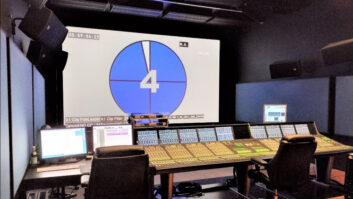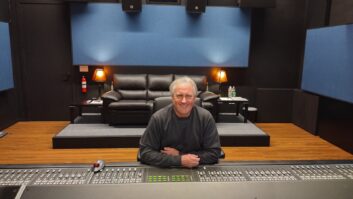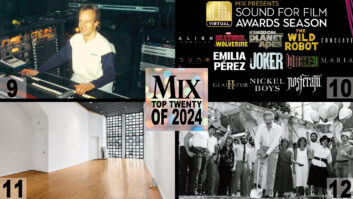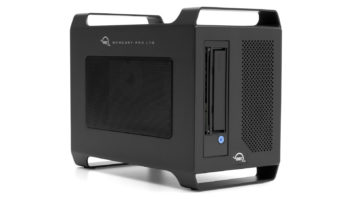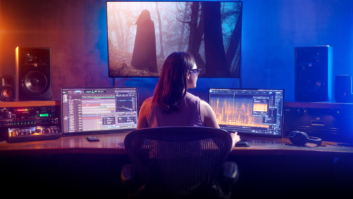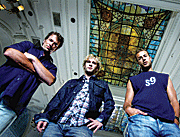
From left: Stroke 9’s Eric Stock, John McDermott and Luke Esterkyn
photo: Ralf Strathman
Two years ago, it really looked like the San Francisco band Stroke 9 was going to take off. Their long road began, incredibly enough, in a Rock Band class at Marin Academy in 1990, survived a few years of bandmembers convening mainly on holiday breaks from college, and then thrived after they honed their chops living together in a small cabin in rural Sonoma County, then moved to San Francisco and hit the club circuit there with their smart, energetic pop/rock. Along the way, they put out a couple of records on their own (including a cheapo, D.I.Y. ADAT affair) and were eventually snapped up by Universal Records on the strength of a showcase gig at the Fillmore in San Francisco and a demo tape they’d recorded at Fantasy Studios in Berkeley. Their second Universal album, the 2002 release, Rip It Off, was magnificent from first song to last and seemed like a sure-fire hit — it combined the catchy, melodic spirit of a group like Jimmy Eats World with the crunch and gloss of, say, Good Charlotte. With production and mixing assistance from the likes of Jerry Harrison, David Kahne, Butch Walker and Tom Lord-Alge, the album had some heavy-hitters in support roles. The CD did okay; it just wasn’t huge, as many had expected, and not long afterward, Stroke 9 was back on the indie circuit again.
“At that point, a lot of bands get discouraged and they can’t suck it up and go back to doing it on their own,” comments Stroke 9 guitarist John McDermott, “but we did. We weren’t going to chuck it. We went back to recording on our own and cheaply, which was actually really exciting and a lot of fun.”
Guitarist John McDermott working at home.
The group’s latest album, All In, released on their own Records, Man! imprint, shows that McDermott, charismatic singer/guitarist Luke Esterkyn and drummer Eric Stock didn’t miss a step after their commercial disappointment and appear to have learned quite a bit from the experience about how to make a good-sounding album. (The trio is now rounded out by bassist Jens Funke.) Judging by the reception the group’s new songs received at a gig I saw at the lovely Fox Theater in Redwood City (where they opened for Cake), Stroke 9 is still on the right track, even without major-label support.
“Pretty much how we did this album,” McDermott says, “is we did all the basic recording at my house in the Presidio [a tree-studded former Army base adjacent to the Golden Gate Bridge in San Francisco]. We do everything in Pro Tools; I don’t even have a console. We have a couple of Digi 001s, and we have a nice-sounding Universal Audio mic pre and a couple of good microphones — we used Audio-Technica 4050s for almost everything. Luke and I did all the songwriting and recording of guitars, bass and vocals at my house. We used the Line 6 Pod for everything; there are no amped guitars. We’d put down scratch vocals, but sometimes the scratch vocals would become the real vocals.
“We used Reason to create loops and create some drum ideas, and then when we got the songs arranged and to the structure we wanted, we sent it down to our drummer, Eric, who lives in L.A. In fact, we’d e-mail a stereo track to him and then he’d cut the drums in his studio using Digital Performer, and he’d e-mail it back to us. Then we’d put on any finishing touches — little bits of percussion or whatever. We experimented and tried a lot of different sounds and messed around. We didn’t restrict ourselves by predetermining that we wanted it to sound a certain way.
“We brought it all to Karl Derfler to mix and he really saved our asses,” McDermott says with a laugh. “He mixed it at Bayview Studios [Richmond, Calif.] on a Trident A Range [console] and did a fantastic job. He doesn’t think things have to sound polished or be a certain way. He likes something that’s unique-sounding, and he’ll always look for the most positive thing in a song and make it sound even more exciting. But he’ll also take an acoustic guitar that maybe doesn’t sound pristine and add some cool effects. He really knows how to use plug-ins, and Bayview also has a lot of nice old [outboard] gear. Karl came in and made everything sound so much better.”
Chastened but not defeated by Stroke 9’s big-label experience, McDermott sounds as upbeat as one of the group’s brightest pop tunes: “We’ve built a pretty good following over the years, and we’re still having a good time and are making good music. So now we’ve gone completely indie — we manage ourselves, we book ourselves, we tour-manage ourselves because we figure we can. In fact, we’re pretty good at it. And now, if things get messed up, we have no one to blame but ourselves!”


